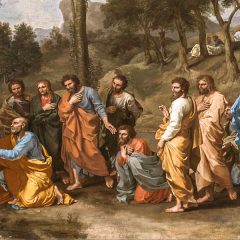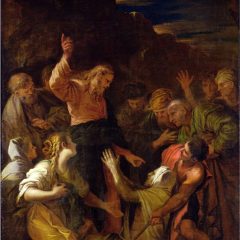faith
Touching The Wounds Of Jesus
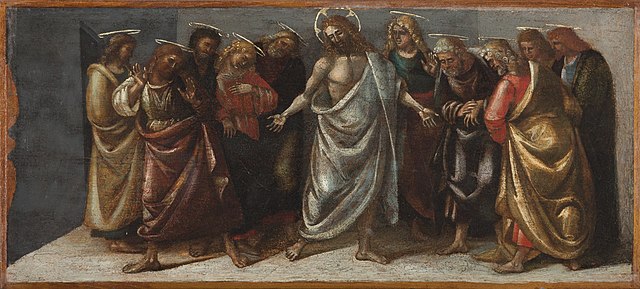
3rd Sunday of Easter 2024
Fr. Mark Gatto
Preached: April 14, 2024
Jesus has wounds. He had wounds even after the Resurrection. Our Christian Faith teaches that Jesus is truly God and truly human. Fully human like us in all things but sin. He suffered and he died. After his Resurrection, the Risen Lord is made known to the the disciples in various ways. It says that Jesus was made known to them in the breaking of the bread. In the appearance in today’s Gospel it says that “he showed them his hands and his feet.” In seeing and touching the wounds of Jesus, they recognized his risen presence with them.
After his death, the disciples struggled with their faith. They were lost in a moment of doubt, abandonment and suffering. The presence of the Risen Lord Jesus gave them hope and courage to move forward. If we are struggling with our faith, if we are feeling abandoned by God or going through some suffering, then we too need to experience the presence of the Risen Lord Jesus. One way we experience the Risen Lord is in the Breaking of the Bread, the Eucharist. But another important way is through seeing and touching the wounds of Jesus.
Where will see and touch the wounds of Jesus today? In suffering and wounded humanity. Jesus shared our humanity, to suffer with us. In the wounds of humanity, we see and touch the wounds of Jesus. In the one human family, in our world today, we need to see the wounds causing so much suffering. In poverty, in war, in divisions. Are we ready to look upon the wounds of humanity? With faith we see and touch the wounds of Jesus in the wounds of humanity. That needs to lead us to work for peace and to heal these wounds in whatever way we are able.
Where will see and touch the wounds of Jesus today? In the wounds found in the body of Christ, the Church. St. Paul speaks of the church as the body of Christ. In the wounds of the church we see and touch the wounds of Jesus. Sometimes wounds caused by persecution.
Recently when in Rome I went to visit the Church of St. Bartholomew on Tiber Island. They created a sanctuary there to remember the martyrs of the 20th and 21st Century. In the various side chapels there was a memory of recent martyrs in various parts of the world. Asia and Oceania, in America, in Europe, in Africa and martyrs of Communism and martyrs of Fascism. Martyrs who were Catholic and also of other Christian churches. When we see these wounds of Jesus in the wounds of the church caused by persecution, it should strengthen our faith by the witness of martyrs.
But we also see wounds caused by injuries and abuse within and by the church itself. Are we ready to see and touch the wounds caused by our church with honesty and desire to work to heal them?
Where will we see and touch the wounds of Jesus? Within ourselves as well. Our own sufferings, our own grief, the hurts and betrayals of life. Jesus embraced our humanity. We can face our own wounds for there we see and touch the wounds of Jesus.
When we are struggling with doubt, with sense of abandonment, with suffering, our faith does not ignore these realities. Like the disciples of Jesus, we need to experience the presence of the Risen Lord Jesus. We need to see and touch the wounds of Jesus found in wounded humanity, found in the wounded body of Christ, the Church and in the wounds within our own lives. Faith allows us to recognize Jesus even in these wounds and then moves us to act to bring healing and light.
You Have To Look Where You’re Going
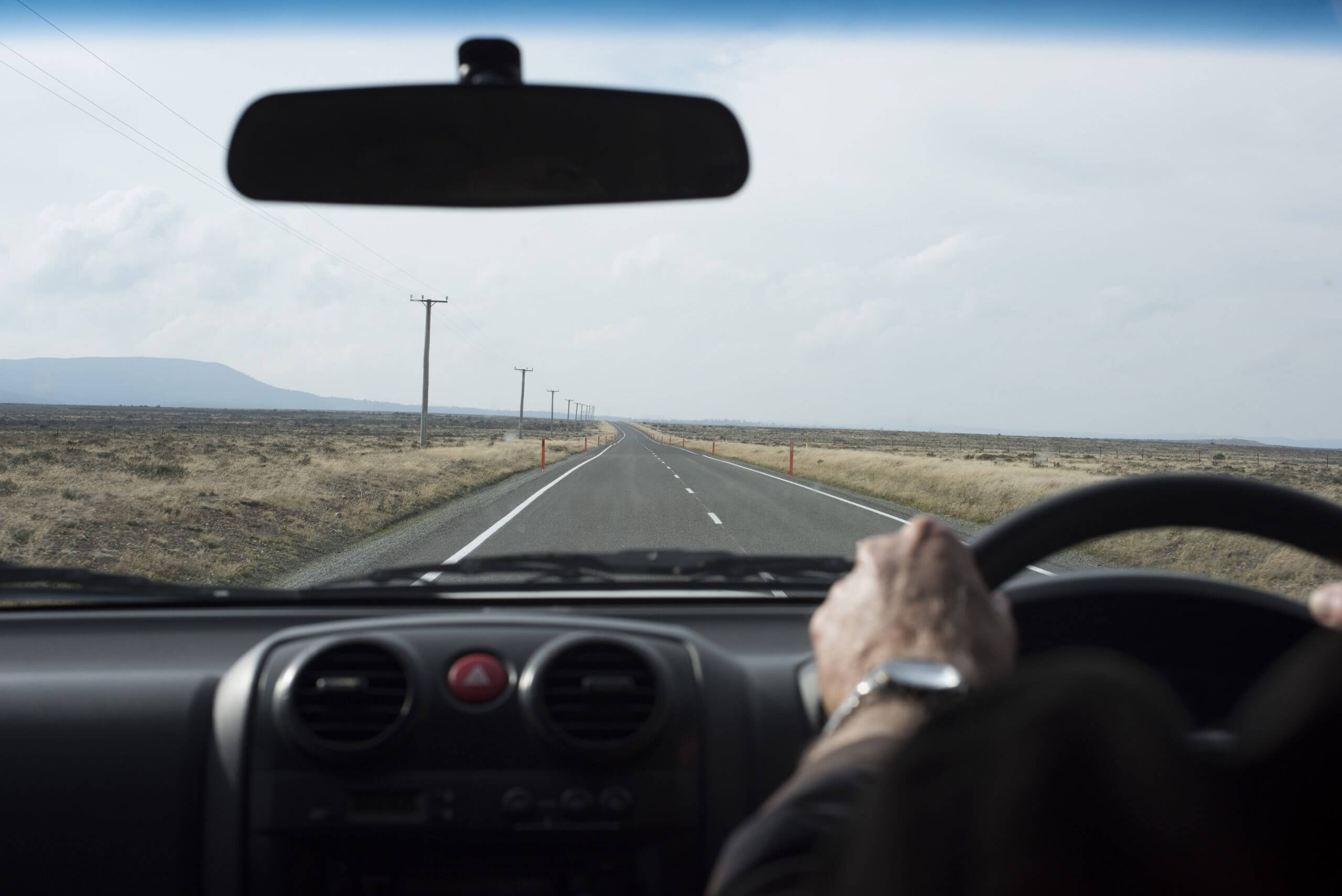
2nd Sunday of Lent
Deacon Tom Vert
Preached: February 25, 2024
You have to look where you are going!
How many people here have taught their children, grandchildren, or others how to drive a car?
One of the first lessons to learn is that you need to look where you are going! If you look straight ahead far down the road, you will drive straight ahead. If you start to look towards the left or right, or at a truck, you will naturally drift that way, subconsciously you can’t help it. This puts you and the car in danger.
Looking where you are going is one of the keys to driving safely.
In the spiritual life, looking where you are going is also critical to staying on the spiritual path, and in my opinion, one of the key reasons for the transfiguration. Jesus knew that his time was coming to an end, he was nearing Jerusalem, and his passion and death were coming close. But also, his resurrection would be coming, and he needed Peter, James, and John, to focus on that truth, focus on that vision of what would happen in order to help get them through the challenges after the crucifixion.
This experience of seeing Jesus’ figure transformed with dazzling white bright energy and the voice of God coming down to say “this is my beloved Son, listen to him”, were key moments that they could anchor on to in their absolute grief after his death.
This moment enhanced their faith even more, just like the moment we saw for Abraham in the first reading. We see Abraham passes this test of faith of offering up his son Isaac, because he already had a close relationship with God who had proven time and again how much he loved Abraham.
Abraham had the history of God supporting him as he moved out of his homeland in Babylon to Israel. He had the focus of the three angels visiting him in the tent and the gift of God of his son Isaac, born to Sarah in her very old age. This knowledge in his heart, this focus, of a loving, caring God allowed him to go through this test, this struggle, with faith in his heart and get even closer to God.
This close relationship, this vision of where we are going is emphasized by St. Paul also in the second reading. He tells the Romans (and us), If God is for us, who can be against us?
In other words, if God is at the centre of our lives, and we have this focus that he has promised us his presence now and in eternal life, then how can we let the distractions of everyday live, the stresses make us look to the side and go off of the spiritual path?
In the verses immediately after today’s readings, Paul makes it crystal clear to all of us when he says: “Who will separate us from the love of Christ? Will hardship, or distress, or persecution, or famine, or nakedness, or peril, or sword?
“For I am convinced that neither death, nor life, nor angels, nor rulers, nor things present, or things to come, nor powers, nor height, nor depth, nor anything else in all creation, will be able to separate us from the love of God in Christ Jesus our Lord”.
This love of Christ, that shines forth so bright that we can’t even look at it is available to us each and every day. It is not something that only happened 2000 years ago, but it is offered to us here and now.
I love how our new church has this symbolically for us to see! Look at the rays that shine forth around Jesus, in a way, transforming the image to show God’s love shining towards us. It is a great reminder of the transfiguration and this symbol of God showing us the way!
God we are told, did not spare his only Son, as he desires to be in a loving relationship with us! His arms are open for us to enter and be close to him!
So how do we put this knowledge to use in our daily spiritual life?
When the storms of life come, the diagnosis of cancer, the loss of a loved one, the failed relationship, or the job stresses, then come to this church during the day, before or after mass, whenever you need to and look directly at our crucified Jesus with the light surrounding him, and say to yourself “You have to look where you are going!”
Choose Faith!
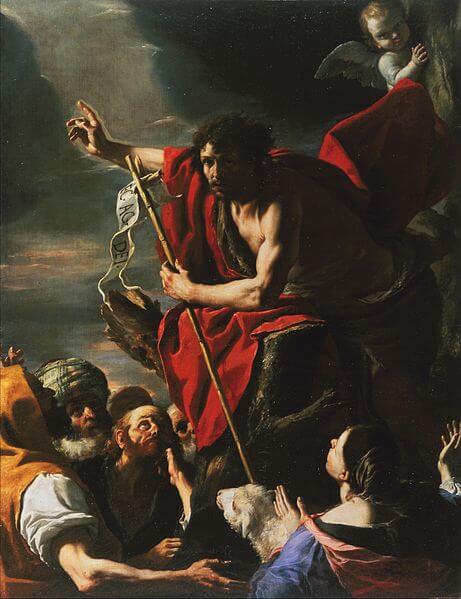
2nd Sunday of Advent 2023
Fr. Mark Gatto
Preached: December 10, 2023
During a visit to one of our Catholic high schools, a young student was speaking to me and he told me that he no longer believed in God. He was a serious and good young man. This was something that he had really reflected on for some time. I realized that he was actually going through what we sometimes call the “dark night of the soul.”
When we do not sense or feel or experience the reality of God. Any faith we may have had at one time seems to be gone. It can feel somewhat empty. What we do not always realize is that this “dark night of the soul” is actually part of the journey of moving to a deeper and truer faith. It clears away childish and simplistic faith and leads to something deeper.
For faith is not a feeling, it is a choice. Just as deep love is not a feeling, it is a choice. At times our love may be full of feeling, but it is in choosing to love even when the feelings are not strong that leads to deeper love. Also with faith, it is in choosing faith even when there are no feelings of God that leads us to a deeper faith.
God wants to be known by us. God chooses to reveal God self to us. God wants to be loved. It is not that we long or desire or search for God. It is God who longs and desires and searches for us. God wants to be revealed to us.
God is infinite, eternal spirit. We human beings are finite creatures. Therefore we are not able to see or experience God directly. It is always indirectly through created reality that God is revealed to us. God is revealed in our experiences of love, beauty, truth, Sacraments, words in the Sacred Scriptures, in creation and in encounters with one another.
God is mystery that we never solve. We can always go deeper. There is always more to be revealed. In fact, in our Catholic teaching in the Catechism of the Catholic Church it says, “Our human words always fall short of the mystery of God.”
This season of Advent is a time of hoping and waiting and longing for God. In Advent we listen to the Prophet Isaiah offering beautiful and poetic images that reveal a God who deeply longs for us. Isaiah describes a voice crying out in the wilderness, “the glory of God shall be revealed.”
God is constantly reaching out into the universe, into our world to be revealed to our hearts. Ultimately in Jesus, the mystery of God entered our human history and reality. To walk with us in a way we could see and hear.
In today’s Gospel we saw the people going out to John the Baptist, they were longing, hoping for the action of God. They were preparing themselves to be touched by God by confessing their sins and being baptized in the river by John.
During this Advent season, do not worry about whether you have faith or not. Choose faith. Prepare your hearts to be ready to recognize God being revealed to you. In Sacrament, in the Word of God, in experiences of love and beauty. God is longing and yearning to be known by us. During Advent, have a heart that longs and hopes and prays and hungers for God.
The Test Of Our Catholic Faith – Will You Pass?
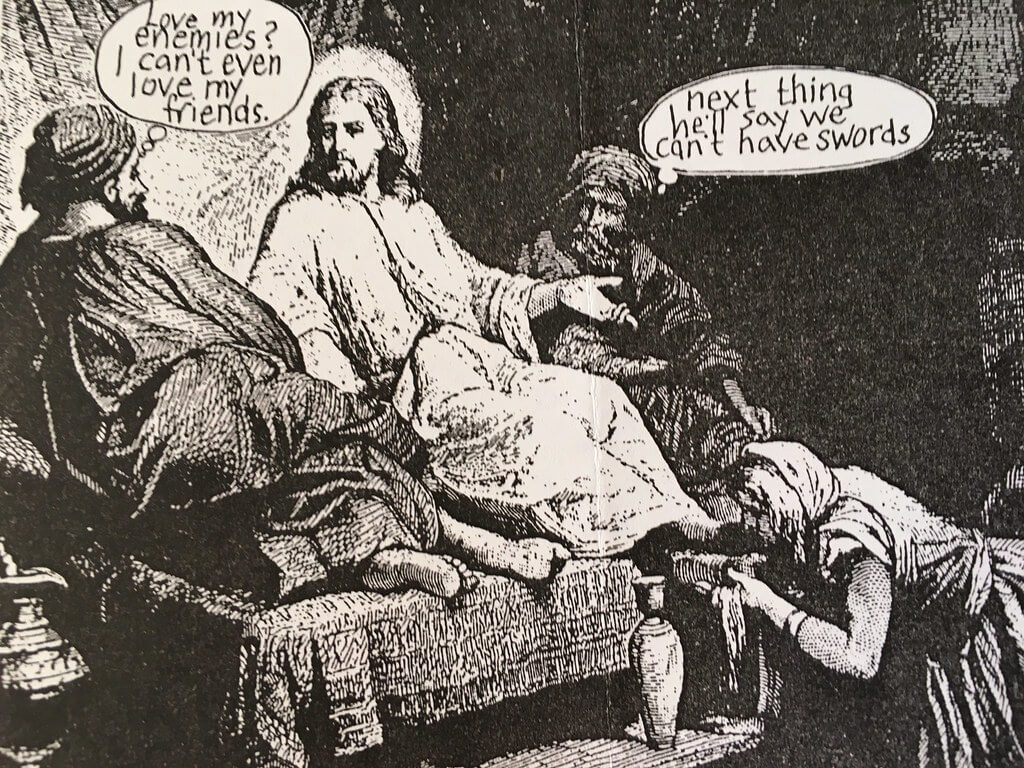
7th Sunday Ordinary Time
Fr. Mark Gatto
Preached: February 20, 2022
“Love your enemies, do good to those who hate you.” Any Christianity that does not take this teaching seriously is superficial and self serving. In fact, the test of our Christian Faith is not if we go to church on Sunday, but do I love my enemies, have I removed hate from my heart?
This is the non-violent vision of Jesus. It is a way of being in this world, a way of being in relationship with our fellow human beings. It is a way of speaking, a way of disagreeing, a way of fighting for justice that rejects violence. It is a way of facing hatred and division without becoming hatred.
In our world today, division, polarization, hatred are all so prevalent. We see divisions between nations, in the news today we see the situation in Ukraine, but we can look throughout our world and see so many examples of division and opposition between nations. Within our families we see so many cases of division and separations.
Within our church we see real polarization, with one group attacking another. We just have to go on Catholic Twitter to see that. Our challenge is to face all of this without giving in to hatred within ourselves. This non-violent vision is not passive. We face evil, we confront injustice, but never with violence, nor with vengeance.
The greatest obstacle to us embracing Love of our enemies is fear. Thomas Merton said, “fear is the root of all violence.” We need to be aware of our fear, what causes me fear. When I do not recognize fear within myself, then I will simply respond, “I hate you.” We need to say rather, “I am afraid.”
When someone is racist, it is usually rooted in a deep fear of those who are different or of losing some privilege. When countries go to war, it is often rooted in fear, fear of losing something, fear of the other which has often been formed over history. When someone is xenophobic and attacks immigrants or refugees, it is usually rooted in fear of losing something or of those who are different. We need to be aware of what we fear. I need to say, “I am afraid” rather than “I hate you.”
When we are fearful, our response is to strike out, attack, destroy the other. Anger inside of us is usually rooted in deep pain, from hurts within us. Over the years in a parish, I have often spoken to office staff about dealing with angry people. I would tell them not to take it personally and realize that when someone is reacting in such anger it is usually rooted in some deep pain they have within, that might not even be related to the present situation. It is for this reason that Martin Luther King said, “hate cannot drive out hate, only love can do that.”
Our mission as the Catholic Church in the world today, our mission as disciples of Jesus today, has to include being instruments of peace. The way we speak, the way we oppose injustice, the way we share our faith, it has to be in a non-violent way. We need to overcome fear, not be guided by fear. Fear is a terrible spiritual director.
We need to be instruments of peace in our families, in our church, on social media, in our world. To be such an instrument of peace we first of all need to find peace within ourselves, we need to struggle to overcome fear and hatred within ourselves.
The God whom Jesus revealed rejects all forms of vengeance and demands no victims. This Kingdom of God means the complete elimination of every form of violence between individuals and nations.
Become instruments of peace, our world desperately needs instruments of peace. The survival of our world and of humanity depends on this.
Perhaps my favourite prayer is known as the Prayer of St. Francis. “Lord, make me an instrument of peace. Where there is hatred, let me sow love.” It goes on to say, “grant that I may not so much seek to be understood, as to understand.” We all want to be understood, we want others to understand how I am feeling, what my views are and so on.
But, the way of the Gospel requires that we first of all try to understand the other person first, what they are feeling, what they are thinking, how they may be hurting inside. It is this dying to self that allows us to be an instrument of peace.
“Love your enemies, do good to those who hate you.”
This is the key test of our Catholic Faith. By overcoming fear and hatred within myself, then it is possible for me to become an instrument of peace.
Where Is Your Heart?
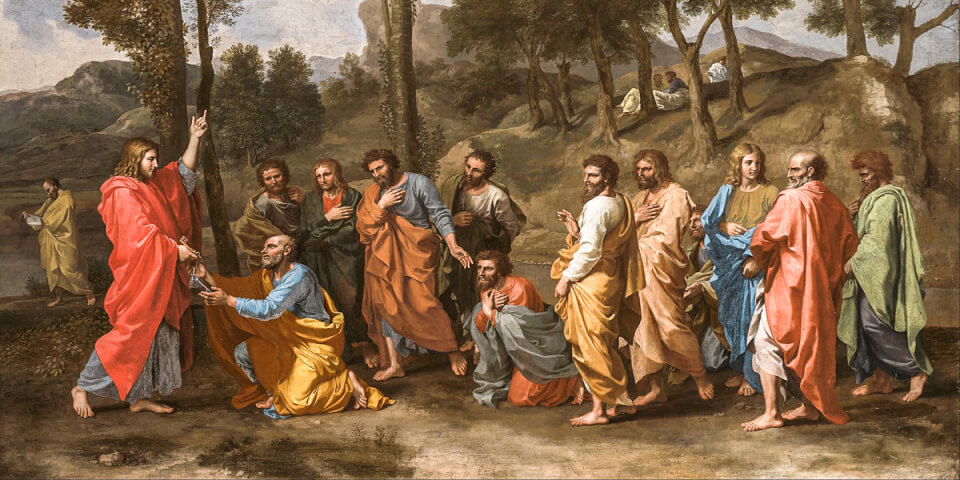
21st Sunday In Ordinary Time
Fr. Mark Gatto
Preached: August 22, 2021
Who or what do you serve? Who or what do you follow? We all serve and follow someone or something. As Catholics we would like to believe that we serve the living God, that we follow the Lord Jesus. But if we honestly examine our lives we will often find that we are serving something in this world. It might be the desire for money or the desire to be popular or the desire for security or the desire to be successful.
Who or what do you serve? Though we say that we serve and follow Jesus, if we honestly examine our lives we will often find that we are mostly just serving ourselves. I am following my own whims and interests.
We just saw a critical moment in the mission of Jesus. Many are leaving Jesus, they have decided not to follow him anymore. As they start leaving, Jesus turns to Peter and his apostles and asks them, “Do you also wish to go away?” We are faced with that same decision today.
Many of you speak to me about family, about friends, about colleagues who no longer practice the faith. They have decided to turn back like some of the disciples in this gospel. Jesus turns to you and to me and asks us as well, “Do you also wish to go away?” We have a decision to make, we have a choice to make in our life. Who will we serve, who will we follow?
If someone was to follow me around for one month, twenty four hours a day following everything I do, what would they see in my life? How do I spend my time and my energy? How do I use my money? What am I reading and watching? Who do I spend my time with and what do I do with my free time? How do I speak and what do I speak about? That person following me around and watching me, would they say, this is a person who serves and follows Jesus?
Maybe the key question is, where is your heart?
Someone once said that Love is a choice, not a feeling. In fact the key to love is to choose it even at times when we are not feeling it. The key to any vocation is to choose to love even when not feeling it. In marriage, a couple do not always feel wonderfully romantic and “in love”. There are times when there is no feeling at all or at least it is just very ordinary. This is when a person needs to continue to choose to love.
Same with priesthood or religious life. It is not always an exciting and mystical experience. Sometimes a priest wakes up and does not feel the presence of God at all and for the most part it is just very ordinary. That is when a priest needs to continue to choose to love.
Just as love is a choice, faith is also a choice. We need to make that choice of faith. Even when not understanding fully, even when not feeling anything special. At those times we need to make the choice of faith. Like Peter we need to answer Jesus, “Lord, to whom can we go, you have the words of eternal life.”
Love and faith are both a choice. It is a choice we need to make day by day. Even when not feeling it, even when the people around us are turning away from faith or rejecting it. We make that choice by the decisions we make in our life, by where we put our time and energy. What would someone see if they were to follow us this whole day?
Who would they say we serve and follow? Where is your heart?
The Catholic Faith Video Series: Your Tough Questions Answered [Video #7]
Question: Why is faith an important aspect of our religion, why is it important to have faith?
Please watch video below for answer:

If you prefer to read, below is Deacon Robin’s Answer:
This is an excellent question and I’m going to answer it by giving an example from our everyday experience of faith and seeing why it’s important.
First, let’s look at something simple that’s part of our everyday. For example, when we enter our homes, we all have a certain level of trust that our home is well built. We probably don’t know who exactly built it or what the exact materials they used are, but we trust that our floor won’t collapse and our roof won’t cave in on us. We have a certain level of faith in the builders, architects, engineers and in the building codes that our house is well built. This is a certain type of faith that we have even though we don’t really think about it much since it’s pretty impersonal.
But let’s make it more personal by another example. We all have certain people that we trust and have faith in. We can look at our parents or close friends and we know that we can have faith in them because of our experience of them, through the years, has shown us that they love us. And because we know they love us, we can believe them; we can trust in them and have faith that they will come through for us. It’s this relationship that we have with them that allows us to trust them.
And when it comes to God it’s similar. We know that God has always loved us and God has communicated His love to us through all of history beginning with creation, Adam and Eve and, most importantly, though Jesus’ death and resurrection; and God continues to come to us and communicate his love for us. This relationship allows us to have faith. And we need to have faith, but it doesn’t mean that we have to turn our logical brains off. To be honest, true faith in God cannot be separated from logic and reason. What we believe must be rational and the more we learn about our faith, the easier it is to have faith in God.
Lastly, I would say that faith is something we must actively want to have. It means that faith is an act of the will but it’s also a gift that God gives us and God wants to give this gift because it’s through faith that we encounter the living God, who is personal and wants to speak to you and lead you. So faith really is necessary and is very powerful because it can give meaning to our lives, show us our purpose; it can be so easy to let fear and stress rule our lives but that’s why it’s important to have faith because it’s through out faith in God’s presence and love for us that we remain in contact with God who loves us.
Thank you for listening in to this Question and Answer series. If you have follow up questions to this answer or have other questions send them in to us.
Imitation Is The Greatest Form Of Flattery
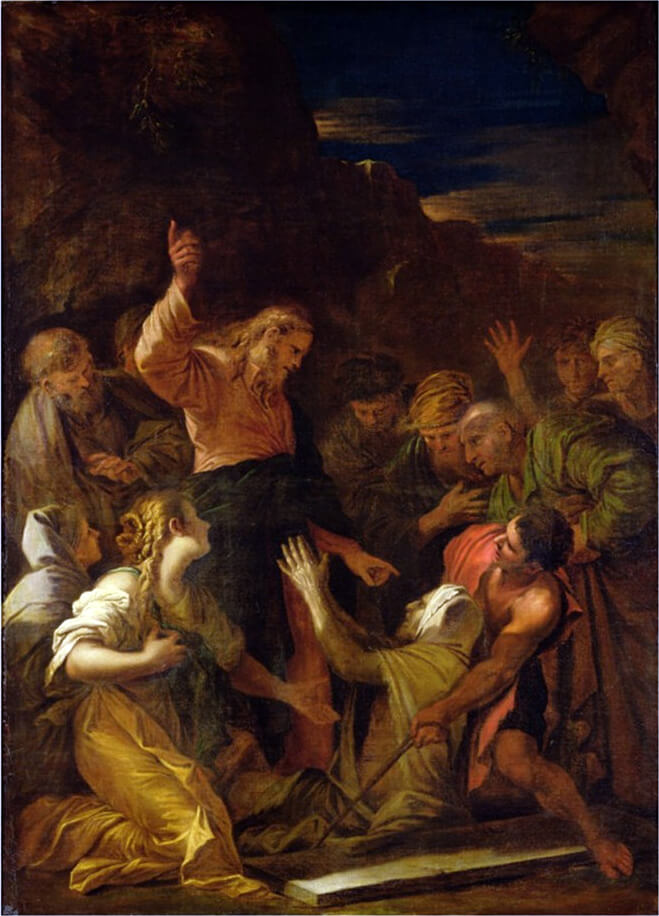
6th Sunday In Ordinary Time
Deacon Tom Vert
Posted: February 14, 2021
Imitation is the greatest form of flattery!
This is a quote we all know, but did you know that the first version of this was written in 1708 to describe the last good Roman emperor in 170AD Marcus Aurelius.
It goes on to say: “You should consider that imitation is the most acceptable part of worship, and that the Gods had much rather Mankind should resemble, than flatter them.”
So, this Roman philosopher points to the fact that God wants our behaviour each day to be more like Him, than to just flatter him with nice words.
This in some way repeats what St. James says: “I will show you my actions that will show you my faith.”
It also echoes what St. Paul is telling us in the 2nd reading today “Be imitators of me, as I am of Christ.”
St. Paul lived his life after his conversion to Christianity as a humble worker trying to spread the gospel message of Good News.
Though he wrote many letters, he always emphasized that the Christian life is one that is lived through actions and not just words.
He tells us in the 2nd reading “whatever you do, do everything for the glory of God.”
He goes on to tell the Corinthians (and us) “Avoid giving offense… try to please everyone in every way” …why…for the “benefit of the many, that they may be saved.”
Pope Francis echoed these same sentiments again in 2019 when he said: “The Church grows not through proselytism but by attraction,”.
He then clarified: “This means, dear friends, that our mission as baptized persons, priests and consecrated men and women, is not really determined by the number or size of spaces that we occupy, but rather by our capacity to generate change and to awaken wonder and compassion,” he said.”
The best way to change the world is to change oneself first, to live a life that others will look and say “what is their secret? What makes them so joyful in the face of adversity? What keeps them so positive in the face of all the negative influences of the world?
The goal of all our actions as St. Paul says is to give glory to God. Love is to be the motivating force, so try to seek how to help another!
All of ones work and outreach should come as a grateful response to God’s grace in that he loves us and cares for us and keeps us strong in the storms of life even though we are not perfect.
This is why we sing the psalm – psalm 32 – we know in our hearts that when we turn to God in time of trouble, He fills us with mercy, forgiveness, love, peace and strength to go ahead – that is the joy of salvation! The joy of the kingdom of God here and now available to us each day!
This is the strength that the leper came to Christ with, a faith knowing that he could be healed, and God could come into his life in a special way.
The wording is interesting because he doesn’t say, “heal me” or “cure me”, but instead says “if you choose, you can make me clean”.
If you choose – how great is this statement of faith! The leper is saying that I know you can cure me, that is not in question at all! He has ultimate faith that Jesus can actually cure him – for that he has no doubt!
He says – if you choose!
In other words – I know that I am totally unworthy – I know that I have been banished outside the city – I know that my family and friends and everyone else has given up on me – but if you choose – I can be healed and proclaimed clean and re-enter society!
What an amazing display of faith and an example for us!
Jesus looks with love and heals the leper and he will heal each of us from the sins, the distractions and the self-reliance that keep us apart from him.
We are called today to be Christ-like and that is to be our goal as “Imitation is the greatest form of flattery!”
Prepare The Way For Faith
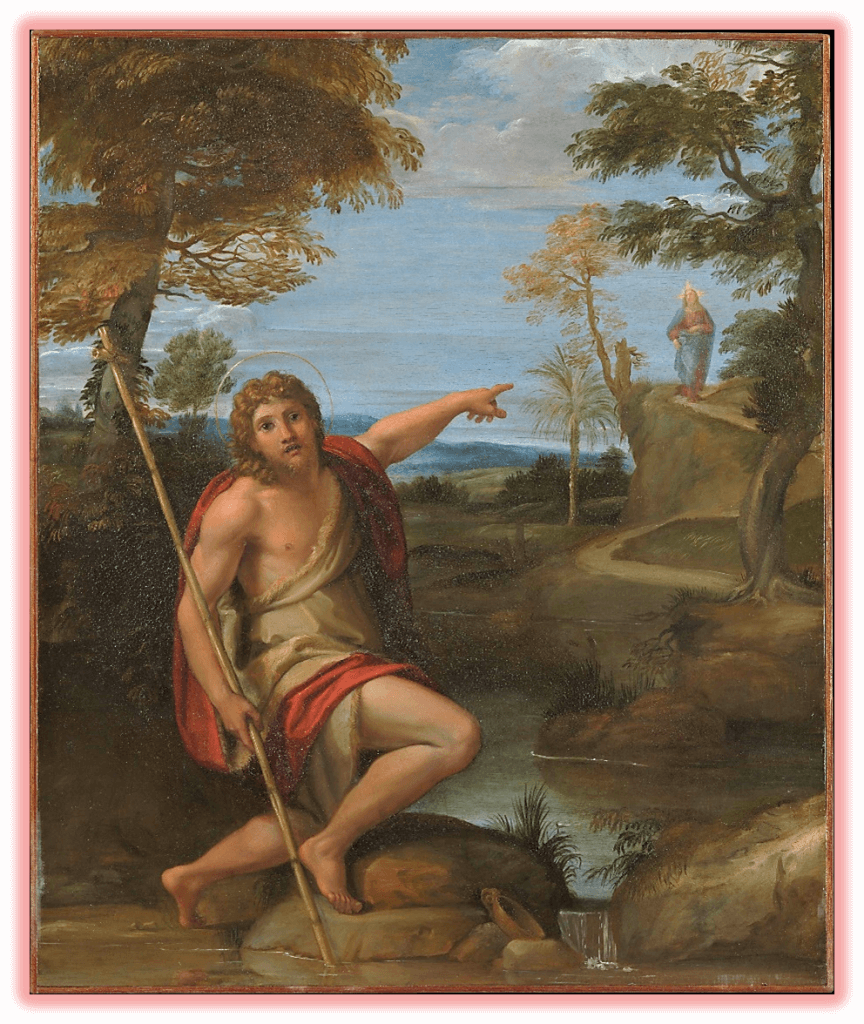
Second Sunday of Advent 2020
Fr. Mark Gatto
Preached: December 6, 2020
Who passed on the faith to you? Which people led you to embrace the faith? Perhaps a parent, or a grandparent. Perhaps a teacher or a priest. Perhaps a friend. Who was an instrument in preparing your heart for faith?
John the Baptist is described as a messenger “the voice of one crying out in the wilderness.” Calling out to people, “Prepare the way of the Lord.” People from the Judean countryside and from Jerusalem were going out to him to be baptized in the river Jordan and to confess their sins.
John the Baptist was preparing their hearts for faith. The season of Advent is a time waiting, of preparation, to open our hearts to faith. What were those people waiting for? For the Messiah, for God’s salvation? What are our hearts waiting for at this time?
Some of you are perhaps waiting to be loved, or to be accepted by someone, or to be healed in some way, or to be forgiven, or to be at peace with someone. During Advent, whatever else, we are all waiting and preparing our hearts for faith.
A child within it’s mother’s womb is waiting, but that child does not know what to expect, cannot imagine life outside the womb. We are like that child in the womb as we live in this life. We are waiting for heaven. In this life we cannot imagine what that heavenly life outside life in this world will be like. We see only in faith.
In our second reading from Peter today, he speaks of the patience of God with us and of our need to wait patiently and in peace. When we do not see the final goal, when we do not feel the presence of God in our lives. Then we need that faith that allows us to wait in peace.
During the season of Advent, the Prophet Isaiah is a focus. You could say that Isaiah is the prophet of Advent. In today’s first reading, Isaiah speaks of how “Every valley shall be lifted up, and every mountain and hill be made low.” What are the mountains and hills that are obstacles to our faith?
Like John the Baptist we need to help one another to prepare our hearts for faith. We need to help others to persevere in faith.
One important way we do this for others is by the words we use, the words we speak to others. Our words matter. Do the words I speak to others prepare the heart of others for faith, or are they obstacles to faith? Isaiah has God speaking these words, “Comfort, O comfort my people,… speak tenderly to Jerusalem.” We need to speak words that comfort others.
In the coming of Jesus the word of God has spoken to humanity, it is Good News. A word of forgiveness. Someone once said that the whole story of Israel is the story of unfaithfulness forgiven.
Like John the Baptist we need to prepare the hearts of others for faith. The words we speak to others need to be words that bring comfort, words that are good news, words that are able to prepare the heart of another for the grace of God. The words I speak to others can either be like a mountain blocking faith or they can prepare the heart for faith.
Be a John the Baptist today, be a messenger that helps people around you to have a heart prepared for faith. Reflect on the words you speak to others. Are they good news, are they able to open the heart for faith?
Two Temptations Christians Face

13th Sunday In Ordinary Time – Year C
Fr. Mark Gatto
Preached: June 30, 2019
What are temptations that are especially dangerous for religious people, in particular for Christians?
In today’s Gospel, we see two temptations that we need to avoid, two temptations that religious people can fall into. The first temptation is that of making excuses. We who are Christians, followers of Jesus, easily make excuses to justify our compromises. We make excuses for not following the way of the Gospel faithfully, for accepting what seems to be an easier way.
As they are on the way to Jerusalem, several persons are called to follow Jesus or ask to follow Jesus. They each respond with, “Yes, but….” Jesus does not accept their excuses, does not accept mediocrity or compromises from those he calls to follow him. He says, “No one who puts his hand to the plough and looks back is fit for the kingdom of God.”
I think of people who will make excuses for not coming to Mass, “I don’t have time, or I am too busy, or I have important things to take care of.” I can imagine the response of Jesus to such excuses.
But, more important are the excuses we make when our faith calls us to act to oppose injustice, to fight against some evil. Or when following the Gospel faithfully, doing what is right and true, will cost us in some way. Then we are often ready to make excuses, to justify our compromises.
Jesus is clear that there are no good excuses for accepting compromise with the truth, with justice, with goodness.
The second temptation for religious people we see in today’s Gospel, is the temptation to a religion that is harsh, condemning, excluding. As Jesus is going toward Jerusalem with his disciples, the Samaritans refused to receive Jesus.
The response of his disciples James and John was to condemn and exclude them, they ask Jesus, “… do you want us to command fire to come down from heaven and consume them?” We see one of the worst temptations of religious people, one of the worst temptations of Christians to condemn, reject, exclude. But, Jesus rebukes them, this is not the way of Jesus.
A true Christian way that reflects the way of Jesus is about inclusion not exclusion, about embracing not rejecting, about bringing into the Kingdom of God and not keeping out.
So, we who are striving to follow Jesus today, those of us called to be Christians today, we need to examine ourselves for two temptations. First, the temptation to make excuses, to compromise, to accept mediocrity in living our Faith. Second, the temptation to a religion that condemns, rejects, excludes.
We are to embrace a Faith that is uncompromising in following the truth, goodness, the way of the Gospel and a Faith that is about inclusion, embracing, opening doors to the Kingdom of God.






